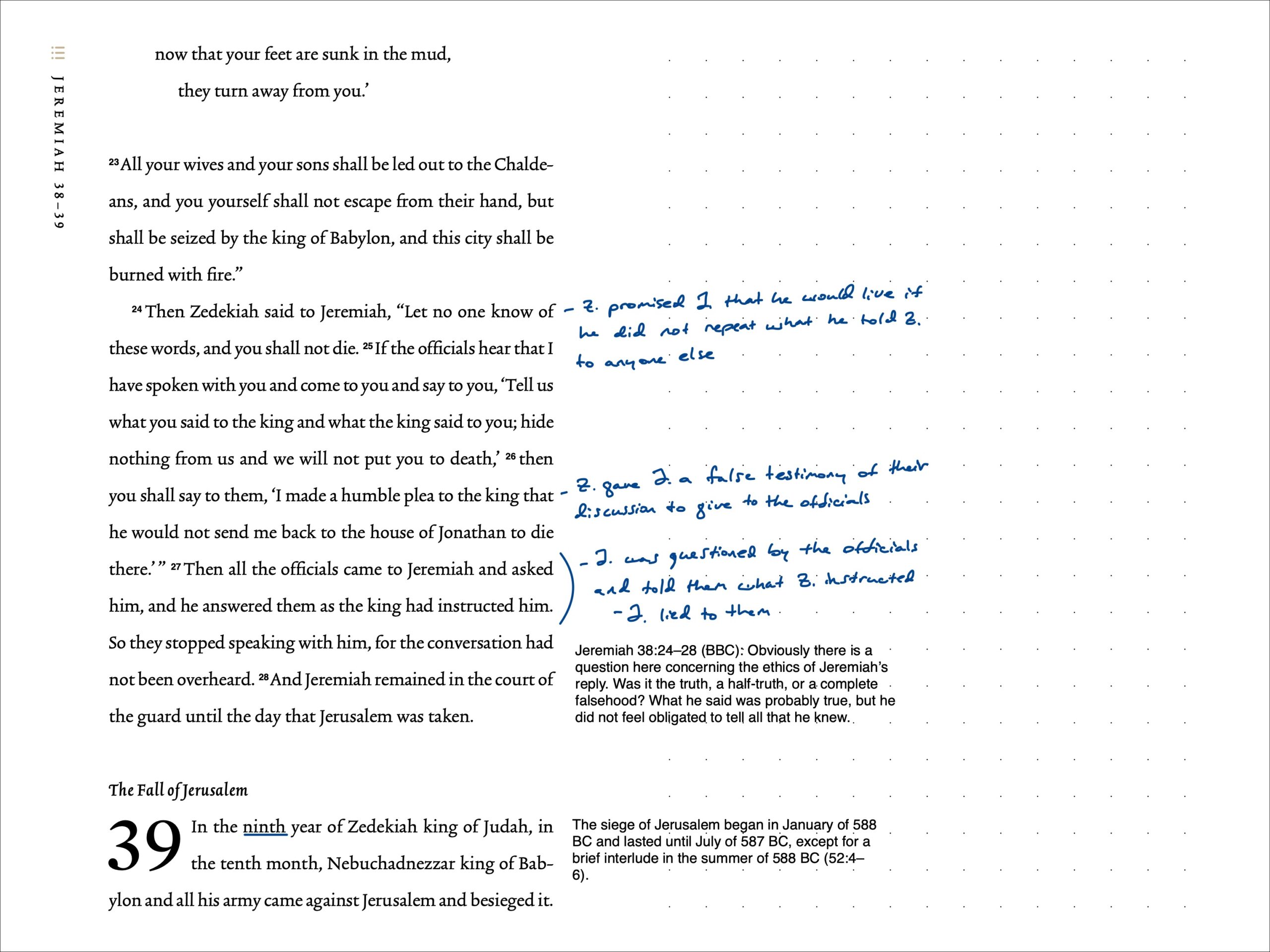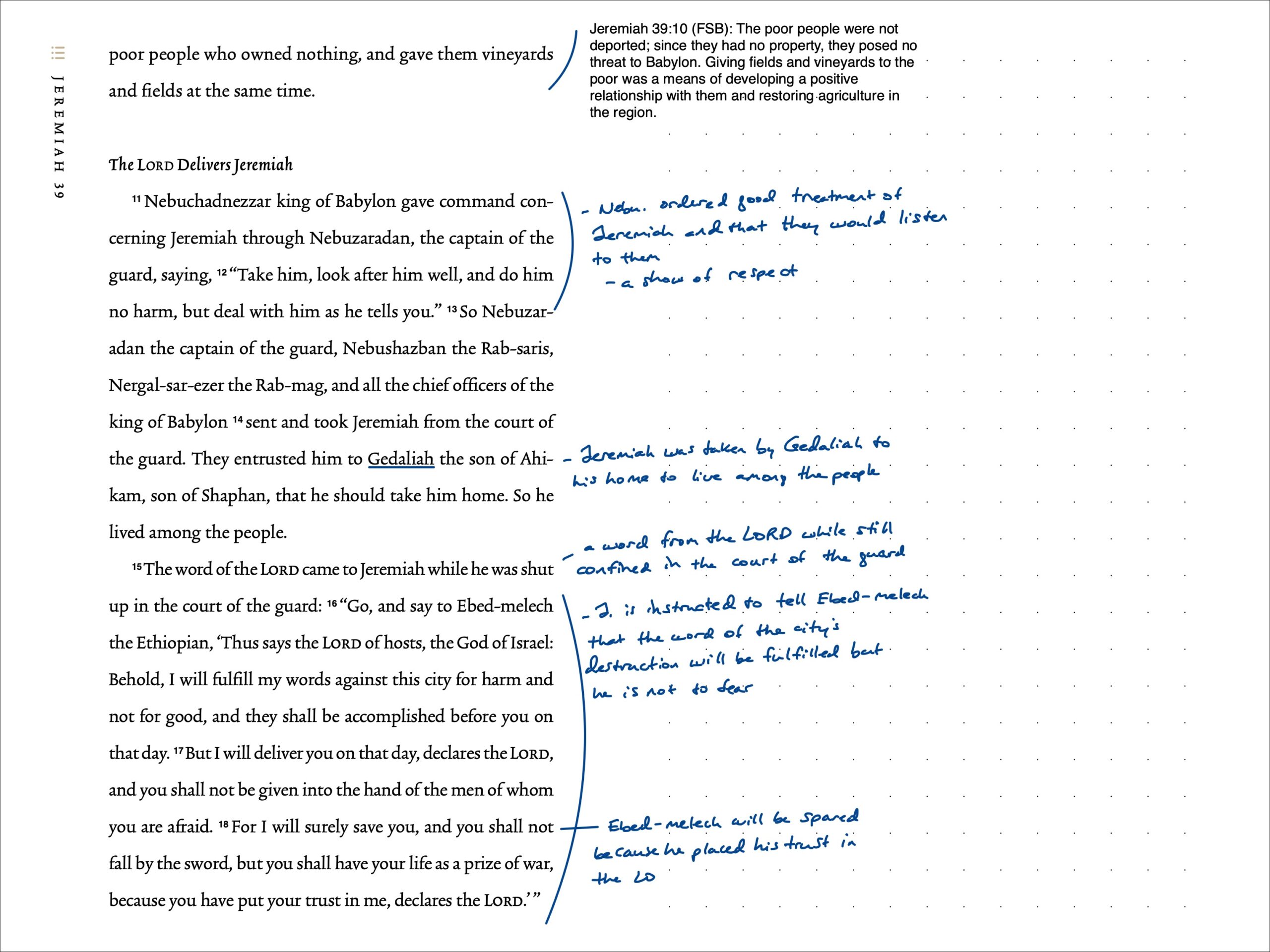| Date | Version | Reading Plan |
|---|---|---|
| @August 1, 2023 | ESV (2016) | ESV Prophets Plan 2023 |
Pericopes
- The Fall of Jerusalem
- The Lord Delivers Jeremiah
Notes
The chapter opens with the Babylonian siege of Jerusalem that began in January of 588 BC and lasted until July of 587 BC, except for the brief interlude in the summer of 588 BC (see Jer. 52:4-6).
In Jer. 39:3, three Babylonian officials came and sat down in the middle gate of Jerusalem. This would probably have been between the upper and lower portions of Jerusalem and was where the Babylonians setup the occupational court of the government.
In Jer. 39:4-5, upon seeing this overthrow of Judaic authority, Zedekiah and the soldiers of Judah fled in fear toward the Arabah. This refers to Jericho in the the Jordan valley, about 20 miles east of Jerusalem. However, the Chaldeans pursued and overtook them and brought them back to Nebuchadnezzar at Riblah where they were sentenced (Jer. 39:5).
Jer. 39:6-7 depicts the witnessing of Zedekiah to the slaughter of his own sons. His eyes were then taken out and was bound in chains to be taken Babylon (Jer. 39:7). That Zedekiah’s eyes were removed directly following the witness of his sons’ deaths underscores the brutality of his treatment as this would have been his last visual memory.
Jer. 39:8-10 describes the destruction of Zedekiah’s house and the breaking of the Jerusalem walls by Babylon (Jer. 39:8). The people were then carried off to exile to Babylon with the exception of some of the poor who were given vineyards and fields to tend (Jer. 39:10). Since they had no property and were no threat to Babylon, the poor people were given fields in order to develop relationship with them and to restore agriculture to the region.
In Jer. 39:11-15, Nubuchadnezzar orders Jeremiah to be looked after well; they were to “do him no harm” but deal with him as he tells them (Jer. 39:12). This was a show of respect for Jeremiah by the king. Jeremiah was entrusted to Gedaliah who took him home with him where he lived among the people. (Jer. 39:14)
The final verses of the chapter (Jer. 39:15-18) are of Jeremiah while he was still shut up “in the court of the guard”. God instructed Jeremiah to tell Ebed-melech, the Ethiopian eunuch, that His words of harm against the city would be fulfilled but that he was not to fear. Ebed-melech would be spared and have his life “as a prize of war” because he had put his trust in the LORD (Jer. 39:18).
Application
The difference in treatment between Zedekiah and Ebed-melech in this chapter is profound. Zedekiah had ignored previous warnings by Jeremiah to surrender willingly to the Babylonians and the repercussions were now in full swing. By contrast, Ebed-melech, who respected Jeremiah’s message and led the effort to free him from the empty cistern (Jer. 38:11-13), was to have his life life as a prize for war because of His faithfulness to the Lord.
How we choose to align ourselves will dictate the outcome of our lives. The favoring of comfort or worldly safety may seem profitable for a time, but are stamped with expiration dates. There is no lasting hope to be found in this world because the world does not contain the key to itself1. It is only when we order ourselves in accordance to the all-surpassing hope in Christ will we acquire eternal blessing.
Scripture Journal Notes
Commentaries & Resources Used
- ESV Study Bible. (Wheaton, IL: Crossway, 2008)
- Faithlife Study Bible (Lexham Press, 2016)
- Believer’s Bible Commentary (Thomas Nelson, 2016)
- CSB Study Bible Notes (Holman Bible Publishers, 2017)
- Matthew Henry’s Commentary on the Whole Bible (Guardian Press, 1976)
- The Bible: A Reader’s Guide (Sterling Publishing, 2011)
- The Infographic Bible (Zondervan, 2018)
- ESV Digital Scripture Journal (Crossway, 2019)
- J. Stafford Wright, The Expositor’s Bible Commentary (Vol 5) Psalms, Proverbs, Ecclesiastes, Song of Songs (Zondervan, 1991)


